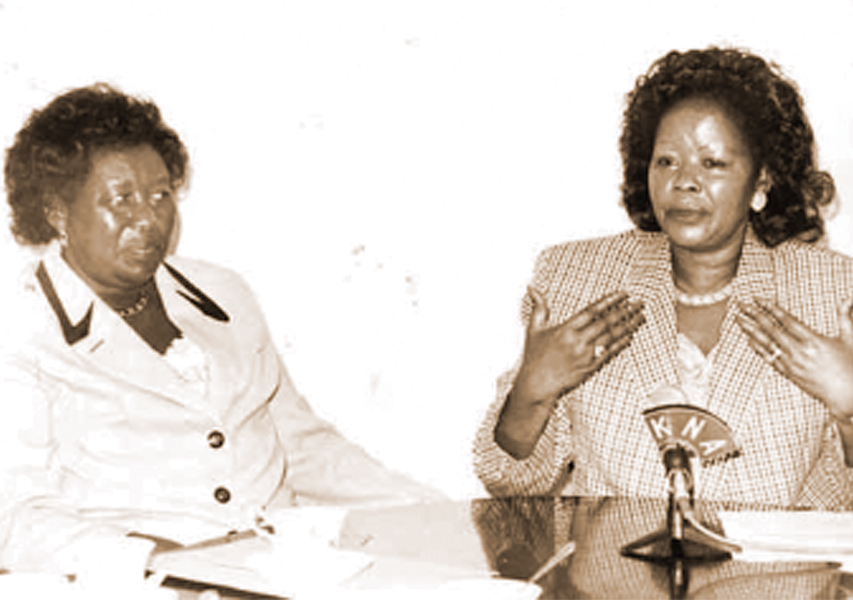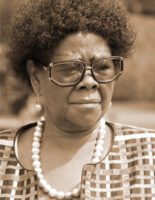
Winfred Nyiva Mwendwa made history when she was appointed by President Daniel arap Moi as Kenya’s first female Cabinet Minister in 1992. She served as Minister for Culture and Social Services.
The widow of Kenya’s first African Chief Justice, Kitili Maluki Mwendwa, the accomplished politician, now in her late 70s, has scored many firsts in her momentous life. She was the first Minister to champion the empowerment of women from a position of true authority and influence. Known to have the ear of the President, her leadership laid emphasis on the education and empowerment of women, and the fight against female genital mutilation and gender violence. She championed women’s political and economic empowerment through elective positions and financial capacity building.
A shrewd political player, Mwendwa knew how to read the signs of the times in order to be in the right political party at the right time. During her colourful political career, she navigated four different political parties. She managed to successfully contest two separate elections on Kenya African National Union (KANU) and National Rainbow Coalition (NARC) tickets. She later stood on an Orange Democratic Movement-Kenya (ODM-K) ticket but lost and later served as Kitui County Women’s Representative on a Wiper Democratic Movement-Kenya (WDM-K) ticket.
A charismatic leader, she pulled crowds and was admired by her constituents. In a field dominated by male politicians, she stamped her authority on Kitui West constituency where she served as Member of Parliament for 15 years: in 1974 and 1992 under KANU and in 2002 under NARC, with a gap in between.
She was the first Minister to champion the empowerment of women from a position of true authority and influence
During the 2007 elections, she contested on an ODM-K ticket but lost. A close ally of Wiper leader Stephen Kalonzo Musyoka, Mwendwa was elected the first Women’s Rep for her county during the subsequent election held in 2013.
However in 2016, she announced her intention to hang up her boots and retire from politics, drawing to a close a tumultuous political career spanning 40 years.
Born in 1941 in the populous Matinyani Sub-County of Kitui County, Mwendwa attended the local Matinyani Primary School before joining the prestigious Alliance Girls High School in Kikuyu, Kiambu. From Alliance, she pursued a Diploma at the University of Nairobi and later studied for a Diploma in Education at the University of Manchester in the United Kingdom. Thereafter, she proceeded to Cornell University, Ithaca, New York in the United States of America for a Master’s Degree in Textile Science, specialising in Interior Design.
Back home, Mwendwa had a one-year stint teaching at an all-girls’ secondary school between 1965 and 1966.
Her husband was the son of Senior Chief Mwendwa Kitavi, a pioneer colonial Chief in Ukambani who had 17 wives. Kitili Mwendwa became one of Kenya’s top legal brains and was appointed first as Permanent Secretary in the Ministry of Home Affairs under Jaramogi Oginga Odinga before being appointed Chief Justice by Kenya’s founding President Mzee Jomo Kenyatta at a time when Charles Mugane Njonjo was the Attorney General.
He died tragically in 1985 in a grisly and mysterious road accident on Thika Road while serving as MP for Kitui West. His death came at a time when the country was rife with rumours of an impending military coup by elements of the Kenya Army led by Armed Forces Chief General Joseph Ndolo; Kitili was rumoured to have been waiting in the wings to take up the position of Vice President. After his death, Kitili’s half-brother Kyale Mwendwa occupied his parliamentary seat in a subsequent by-election and was appointed Minister for Water Development. His elder brother, Eliud Ngala Mwendwa, was a member of Kenyatta’s first Cabinet, serving in the Labour docket.
Thus Nyiva Mwendwa had been married into a huge family that produced some of the most prominent personalities in Kenya. With her political exposure and education, it seemed only natural that she join politics. Indeed, before her debut into elective politics in 1974, she frequently accompanied her husband and addressed political rallies and other functions that further sparked her interest in elective politics.
She also mobilised women to form self-help groups and initiated other development initiatives, notably water projects in Kitui, a semi-arid area that often experiences drought. Her entry into politics was made easier when her brother-in-law, Eliud Ngala, moved base from Kitui West to Kitui Central, thus guaranteeing her election.
She served as MP from 1974 and made her mark as an able debater in the House who worked tirelessly for the interests of her constituents. Her success notwithstanding, she was unseated in the 1978 elections by Parliamentary Chief Whip and fiery politician Perminus Munyasia.
Mwendwa recaptured the seat in the 1992 General Election and was appointed Assistant Minister for Public Works and Housing. But her most momentous day came on 9 May 1992 when she was promoted to full Cabinet Minister for Culture and Social Services. Her ministerial appointment triggered an avalanche of messages of congratulations from local politicians and organisations, as well as foreign governments and international organisations commending the great strides Kenya had achieved in promoting the position of women in politics.
Indeed, not many women held Cabinet positions on the African continent during that time. Notable figures who blazed this trail in Africa included Gaositwe K.T. Chiepe who was appointed to the senior ministerial portfolio of Foreign Affairs of Botswana in 1985, and Ivory Coast’s Jacqueline Oble who served as Minister of Justice between 1991 and 1994. During Mwendwa’s term in the Cabinet, Rwanda had a female Prime Minister, Agathe Uwilingiyimana (1993), while neighbouring Uganda boasted a female Vice President, Specioza Kazibwe (1994).
Mwendwa’s appointment had come only a few days to the Fourth World Women’s Conference in Beijing, China. An impeccably dressed and well-groomed woman, Mwendwa is widely remembered for a rather controversial decision in 1995 to include her hairdresser as part of her delegation to the conference. She offered a spirited defence for her decision, saying that as leader of the delegation, she had to take good care of her appearance.
In Parliament, she sat on several Parliamentary Committees such as Catering and Health Club, and also the Departmental Committee on Defence and Foreign Relations. She is remembered for her sterling performances when she presented government motions in Parliament or when she answered questions from Members of the august House. Quite often, her entry into the Chamber was preceded by a thunderous foot-thumping welcome from the members, some out of deference to the gracious lady.
As Cabinet Minister, Mwendwa forged close working relations with the Head of State and kept close tabs with top officials of KANU, both at the Kitui Branch and at the national level. Quite adeptly, and in order to make her work easier, she invited Moi to preside over numerous women’s activities that she initiated in order to promote the women’s agenda. She also roped in powerful KANU functionaries, mostly Cabinet Ministers and Assistant Ministers, whenever she was presiding over fundraising rallies in aid of women’s projects in her constituency.
The activities she was involved in were mainly centred on women’s education and empowerment, and the fight against female genital mutilation and gender violence. She championed women’s political and economic empowerment through elective positions and financial capacity building. Many of these areas she supported have since borne fruit.
Given her unique position as the only female Cabinet Minister, Mwendwa was kept extremely busy officiating at numerous functions for women-based organisations. Her clarion call was the empowerment of women not only in Kenya, but in Africa. She forged close ties with and strengthened the capacity of women’s organisations across the country, especially the influential Maendeleo Ya Wanawake (empowerment of women) then led by Zipporah Kittony.
Today, the fruits of her efforts are clear for all to see, what with the impressive number of women in elective positions at all levels in Kenya, the number in the Cabinet and the civil service, CEOs in multi-million shilling parastatals and private companies involved in hospitality, real estate, consultancies, agriculture and manufacturing, not to mention the millions in the informal sector.
Speaking during the launch of the David Musila Foundation in Kitui in 2016, Mwendwa told the media, “I want to declare today that I have decided to retire from active politics to do other business. I will not seek any elective position in future.” She said she would strive to become a political advisor and family counsellor.
Mwendwa looks back on her 40-year political career with pride at her achievements at national, county and constituency level. In particular, she prides herself for not having been implicated in corruption either as a Cabinet Minister, MP or Women’s Rep.
Mwendwa has not only been an inspiration to women in general, but also to fellow widows, having lost her husband 23 years ago. In an interview with The Standard newspaper in January 2017 soon after her retirement from politics, she advised widows to “…never allow despair to get the better of you. You should march on with determination and resolve. Complete whatever work you started with your husband, if you can. Do even better where possible.”
Although Mwendwa never remarried, she advised widows to remarry for the sake of the children if they feel they cannot manage on their own. “Do not accept a ‘come-we-stay’ arrangement,” she advised. She dismissed wife inheritance as “…a good thing overtaken by time and circumstances.”
Mwendwa considers herself lucky in this regard, because her two children, Kavinya and Maluki, were aged 19 and 17 respectively when their father died. She ensured that they pursued their education overseas uninterrupted. “Keeping aloof will break you. Share your problems with other widows. Mama Ngina Kenyatta (Kenya’s pioneer First Lady), Pamela Mboya and Mrs Argwings Kodhek (both widows of Cabinet Ministers in the Kenyatta government) were close to me and I consulted them a lot,” she said. She takes credit for advocating for women’s rights during the Beijing women’s conference, but regrets that the lot of women has not improved to the levels anticipated in the conference objectives, especially in areas of water, food security and poverty. Successive governments, she laments, have failed to address women’s needs.
“When we passed the new Constitution, I was sure that the position of the County Women’s Representative would serve to address the plight of women right from the village level, but things have not changed, especially because the position is not supported through funding,” she remarked.
Her exit from politics brought to an end a political era.
Given her sterling performance in the Cabinet of Moi’s government, Mwendwa will go down in history as a leader who opened the floodgates for the empowerment of women in Kenya.
